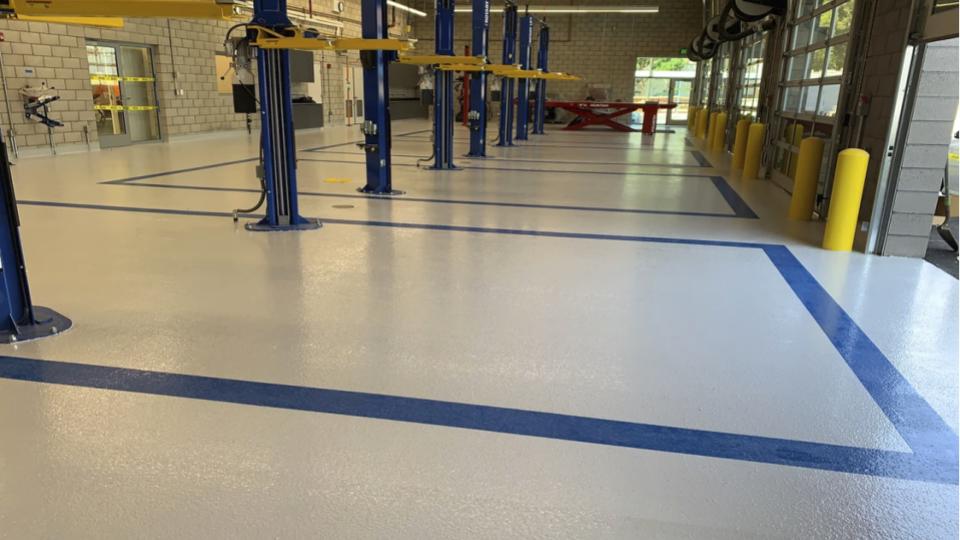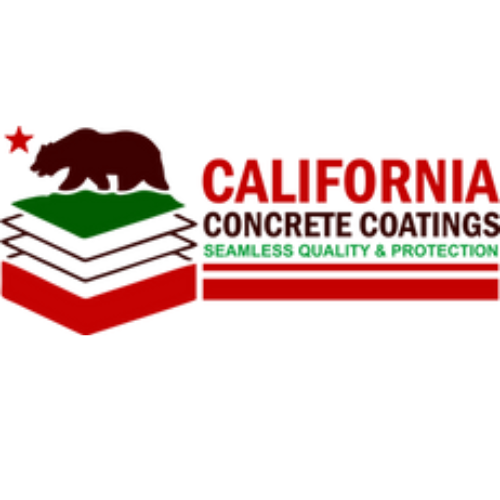Learn more about Automotive and Auto Service Center FLOORING SYSTEMS
Automotive and Auto Service Centers
Among the countless types of facilities in the automotive industry, all share a common need: flooring that can withstand the weight of automobiles and other transport vehicles on a daily basis. Epoxy, polyurethane, and similar fluid-applied flooring systems are installed to create a strong, solid, virtually seamless surface to minimize vulnerabilities wherein uncoated concrete would eventually begin to scratch, chip, or crumble. With the heavy machinery used in certain automotive industry settings, the flooring system must possess exceptional compressive and tensile strength, plus outstanding abrasion resistance and the ability to withstand impact when items fall from forklifts or when mechanics inadvertently drop small tools.

STILL NOT SURE?
Your Questions, Answered Explore Our FAQs
Your Questions, Answered
How much downtime should we expect for installation?
Most of our installations are completed over the weekend to minimize disruption. We
regularly work extended hours on Saturdays and Sundays so your floors are ready for
use by Monday at 6 AM. Our experience, efficient crews, and use of fast-cure resin
systems give us a competitive edge in meeting tight turnaround windows without
compromising quality.
Can resinous flooring systems handle forklift traffic, chemical exposure, and
harsh environments?
Yes. Our resinous flooring systems are engineered to meet the demands of industrial
environments—from heavy forklift traffic and impact zones to areas exposed to
chemicals, oils, or washdowns.
System selection depends on your specific use case. We install:
• Thin-mil systems (1/16”) – ideal for workstations and foot traffic
• Textured, 4-layer systems (1/8”) – durable and budget-conscious
• Heavy-duty systems (1/4”) – built for constant forklift use and heavy impact
For chemical resistance, the topcoat is key. We use high-performance urethanes and
Novolac epoxies, vinyl ester resins that offer superior chemical and abrasion resistance
compared to standard epoxy systems. These finishes are selected based on the
substances present in your facility—whether that’s solvents, acids, oils, or cleaning
agents.
There’s no one-size-fits-all. We work directly with facility managers to tailor a system
that fits both performance demands and budget.
What kind of surface preparation is required before installation?
Proper surface preparation is critical to the success of any flooring system. We
mechanically prepare the substrate using industrial grinders or shot blasters to achieve
the correct surface profile for coating adhesion (per ICRI CSP standards).
We also test for concrete moisture vapor transmission, which is one of the most
common causes of coating failure. When moisture is detected, we install a moisture
mitigation primer—formulated to be applied up to 5 times thicker than standard
epoxy primers. These specialized products are designed to block moisture from
migrating up through the slab and are often backed by manufacturer warranties,
providing long-term protection and peace of mind.
Every project starts with a site evaluation where we assess the slab condition, test for
contaminants, and recommend the right prep approach. Cutting corners on prep can
shorten the life of even the best system—so we don’t take chances.
Do your coatings meet regulatory or industry-specific compliance standards?
Yes. We install flooring systems that help clients meet a wide range of regulatory and
industry-specific standards, including:
• OSHA slip-resistance and safety guidelines
• USDA/FDA compliance for food and beverage processing
• ANSI/ESD S20.20 static control for aerospace and electronics
• Cleanroom and GMP standards for sterile or controlled environments
• VOC-compliant systems for indoor air quality and LEED projects
Many of the systems we install are manufacturer-tested and certified to meet these
specific requirements. We can provide full technical data sheets, LEED
documentation, and submittal packages upon request to support project
specifications and audit preparation.
We stay up to date with evolving regulations and work closely with your team to ensure
the flooring system aligns with both performance and compliance goals—so your facility
stays inspection-ready.
What warranty or maintenance support do you provide?
Every project we install includes a 1-year workmanship warranty from California
Concrete Coatings, in addition to a manufacturer-backed system warranty based on
the products used and the environment they’re installed in. This dual coverage gives our
clients confidence in both the materials and the installation quality.
We also support long-term performance with optional maintenance and cleaning
services, especially for high-traffic areas like parking decks. For example, we return
annually to clean and inspect the deck coating at the Los Angeles Film School—helping
them retain their warranty while protecting their investment.
If you prefer to handle maintenance in-house, we provide detailed care guidelines to
keep your floors in warranty-ready condition. For clients who want full lifecycle support,
we offer recoats, inspections, and industrial cleaning as needed.
Can you help with budgeting or phased installation across multiple areas or
locations?
Absolutely. Budgets are real—and we respect that. There’s a common misconception
that installers aim to max out whatever budget is available, but that’s not how we
operate. During site visits, we have open conversations about performance goals,
timelines, and budget expectations—so we can recommend a system that works for
your facility and your bottom line.
For example, a food processing plant with forklift and pallet traffic in a wet environment
might expect to need a full removal of existing floor and the installation of ¼” heavy-
duty system. But if the existing flooring system is in sound condition, a recoat using a ⅛”
textured system could still deliver the performance needed—at a significantly lower
cost.
Phased projects can add complexity, and mobilization fees may apply if multiple trips or
setups are needed. But we’ll walk you through that transparently so you can make
informed decisions. Our goal is always to develop a performance-based solution that
aligns with your operational needs and your budget—not to inflate it.
